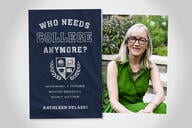You have /5 articles left.
Sign up for a free account or log in.
Two major higher education associations released a statement Wednesday designed to make clear (to Margaret Spellings and whoever else might be listening) that college leaders are fully committed to meeting the call for collecting and making public more and better information about how and what students learn. And while the document departs in some key ways from the themes advanced by Spellings and other policy makers pressuring higher education of late, it drew praise from one prominent critic: the former chairman of the secretary's Commission on the Future of Higher Education.
The document, "New Leadership for Student Learning and Accountability: A Statement of Principles, Commitments to Action," was produced by the Association of American Colleges and Universities, which represents 1,100 public and private colleges and focuses on liberal education, and the Council for Higher Education Accreditation, an association of colleges that coordinates accreditation nationally. It was drafted in consultation with and praised (but not formally endorsed) by several other leading higher education groups, whose leaders appeared at a session Wednesday at the accreditation council's annual meeting where the new statement was unveiled.
Colleges and universities have been under heavy pressure in the last two years from the Spellings-led Education Department and others to be more accountable for how successfully they educate students. Many faculty members and college leaders have complained that their efforts to do so have been unfairly ignored and that the critics have promoted oversimplified and potentially destructive approaches to measure and report learning outcomes, such as an overemphasis on standardized tests. But many higher education groups have also acknowledged, sometimes grudgingly, that the external pressure has propelled their efforts in useful ways.
AACU and CHEA began discussions last spring aimed at seeing "whether we could now commit ourselves to simple guiding principles around which we could make public the activities that are going on," Carol Geary Schneider, president of AACU, said in describing the new statement Wednesday.
The statement went through many drafts and reworkings, and an early version drew criticism from some scholarly groups who said they feared it would send colleges too far in the direction favored by the Bush administration and would open the door to government intervention.
The final version released Wednesday strives to strike a balance between responding to the public pressure for more accountability in measuring and reporting learning outcomes, yet firmly embracing the idea that individual institutions should decide for themselves what to measure and how to do so. Schneider said it was "no accident" that the statement calls for "new leadership" on student learning issues, saying it is time for higher education leaders to step to the forefront and government officials to recede.
"The primary responsibility for achieving excellence falls on colleges and universities themselves," the statement says. While accrediting associations, scholarly groups and foundations and governments all have a role to play in exhorting and pressing colleges to assess learning outcomes, "we strongly endorse the principle that quality standards must be set and met by institutions themselves and not by external agencies."
Every college and each major school and program within them "should develop ambitious, specific, and clearly stated goals for student learning appropriate to its mission, resources, tradition, student body, and community setting," and while those goals may vary from institution to institution, "they should include the enrichment of both individual lives and our democratic society as a whole through the study of science, social science, the humanities, and the arts."
The institutions should "gather evidence about how well students in various programs are achieving learning goals across the curriculum and about the ability of its graduates to succeed in a challenging and rapidly changing world," and the information should be used, as it historically has been, to help the institutions figure out how best to improve their performance.
But it should also be shared with the public, through an "easily intelligible summary of conclusions drawn from evidence about student learning and a clear description of the process of continuous improvement on a campus. Such information and evidence will help the public learn more about the multiple aims of college study and about campus priorities for strengthening learning."
The clearest way in which the statement parts ways with the push made by the Spellings-led Education Department is in its purposeful shunning of the idea that higher education should be working toward developing readily comparable ways of measuring student learning. While department leaders have insisted repeatedly that they have never sought to impose on colleges a "one size fits all" approach to student outcomes, as some higher education officials have asserted, politicians have urged the development of tests and other measures that would make it easy for students and families to compare the academic outcomes of students at various colleges a student might like to attend -- a kind of comparison that could only be made if many colleges used similar standardized measures. Two associations of public universities have adopted a Voluntary System of Accountability that, consistent with the department's thrust, would require participants to use and report their outcomes on one of three measures of student learning.
The new statement goes out of its way to avoid such an approach. "We welcome the progress various associations of colleges and universities have made in developing widely agreed upon templates that will provide college applicants, their parents, legislators, and the general public with important data about demographics, admission and completion information, costs and financial aid, student engagement, and other relevant information," the AACU/CHEA statement says. And "[w]e commend those organizations and their philanthropic supporters that have in recent years developed promising means of assessing important outcomes of higher education."
But "[u]nderstanding that standardized measures currently address only a small part of what matters in college, we will work with foundations and campus partners to substantially expand the array of educationally valid and useful means -- qualitative as well as quantitative -- of assessing the full range of learning outcomes envisioned in this document."
Schneider, the AACU president, said it was purposeful that the word "comparable" appeared nowhere in the groups' document. "We think it would be premature to rush to comparability when we are still inventing tools that we will use to measure outcomes.... We did aim to have some comparability in the categories of outcomes that we should be striving for."
In an interview, Charles Miller, the Texas businessman and Spellings confidante who led the secretary's federal commission that studied higher education, noted the document's avoidance of comparability and standardization and said it raised the question, "Can you get information that the public and the institution can use if you don't have some comparability?" The fear of comparability is particularly noteworthy given that the academy is filled, he said, "with people who depend on standardized testing more than any other industry," at the admissions stage.
But that quibble aside, Miller applauded the AACU/CHEA statement as "high principled and a really strong, favorable effort.... I like the sound of most of these things, and it could be used as a roadmap for people to do the right thing."
Noting that item No. 1 on the groups' "action plan" is encouraging a "vigorous discussion with the goal of implementing" the statement's principles on campuses "as fully as possible in the near future," Miller added: "If this opens up the discussion, I think it's a very positive step."





